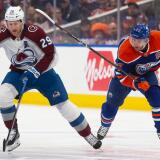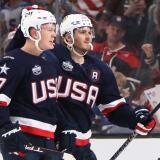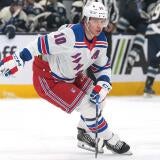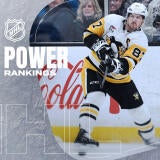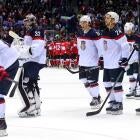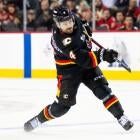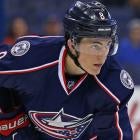NHL Playoffs 2018: 5 reasons the Anaheim Ducks were knocked out by the San Jose Sharks
Breaking down where things went wrong for the Ducks
The Anaheim Ducks are dead.
The Sharks refused to share the water and made quick work of the Ducks, closing out a four-game sweep in San Jose on Wednesday night. The Sharks are the second team to complete a sweep in as many days after the Golden Knights knocked out the Kings on Tuesday. San Jose and Vegas will meet in the second round, eventually.
As for the Ducks, their poor play is rewarded with an extra long summer vacation, most of which will be spent wondering how they managed to go from sweeping in the first round a year ago to handing over the broom this time around.
Let's take a look at exactly what went wrong.
Ducks scored just two goals at 5v5
Despite decent possession numbers, the Ducks' offense was pretty awful in this series -- especially when you consider that two of their four goals came on the power play. Jakub Silvferberg's goal in Game 2 and Andrew Cogliano's goal in Game 4 were the only two goals that Anaheim got at 5-on-5.
The Ducks weren't great offensively during the regular season (they finished 18th in scoring) and they basically live and die by the production of their top six forwards.
Rickard Rakell, Ryan Getzlaf, Corey Perry, Jakob Silfverberg, and Ondrej Kase comprised the Ducks' top five point-getters this season. Adam Henrique, who was traded to Anaheim midway through the year and slid down to the third line when Getzlaf returned from injury, could figure into that list, despite only 36 of his 50 points coming in Anaheim.
Those six guys accounted for a total of just seven points in the series.
Perry had an especially rough series. Not only did he fail to record a single point, he was also a team-worst minus-five in the series and took dumb penalties for crap like this.
The Corey Perry dirty play of the game pic.twitter.com/MAGBULsXgy
— Sharks on NBCS (@NBCSSharks) April 17, 2018
Well here comes Corey Perry pic.twitter.com/9Zsiti0Gby
— Pete Blackburn (@PeteBlackburn) April 15, 2018
Anaheim relies on their top playmakers far too much for them to be as unproductive as they were in this series.
Anaheim's defense couldn't hold it together
The Ducks entered this series with the fourth-best defense in the league during the regular season in terms of goals allowed. However, they were without one of their better two-way blue liners in Cam Fowler, and that was a key absence.
Hampus Lindholm, Josh Manson, Brandon Montour and Francois Beauchemin tried to hold the line and withstand the Sharks' attack, but they had a tough time. The Ducks' third pairing was consistently run over during the series.
Anaheim had trouble dealing with San Jose's speed on the breakout and allowed far too many odd-man rushes. The Sharks used their speed and smarts to catch Anaheim in transition and were able to execute on a significant number of opportunities on the rush. John Gibson's numbers look bad, but he was left out to dry a lot.
Martin Jones gave them nothing
The Ducks were able to put a good number of shots on net in this series (they outshot San Jose 132-129) but Martin Jones was spectacular in net, stopping 128 of those 132 shots for a save percentage of .970.
Jones had a solid year for the Sharks in the regular season, winning 30 games with a save percentage of .915, but he was on another level in the first round. He was great on high-pressure chances in close and on the power play, denying several opportunities that could have easily resulted in goals. And with two games being decided by a single goal, this series could still be going on if Jones wasn't as steady as he was.
Martin Jones still out here doing the damn thing pic.twitter.com/claKuWV0JD
— Pete Blackburn (@PeteBlackburn) April 19, 2018
A .970 save percentage probably isn't sustainable, but the Sharks are going to need Jones to keep up his high level of play against the Golden Knights next round.
Dumb hockey and bad penalties
In addition to the Ducks' lack of production, a major difference in this series lies in the number of opportunities giftwrapped by Anaheim.
The Ducks were often reckless and sloppy, resulting in a plethora of odd-man rushes for the speedy Sharks attack. San Jose, to their credit, did a great job of executing on their chances.
But Anaheim's sloppy play also resulted in 20 power-play opportunities for the Sharks through four games, six of which they were able to convert on. Taking that many penalties is just asking for trouble, especially when you're tied or playing from behind, which the Ducks were for all but nine minutes of this series.
The Ducks also failed to make many adjustments when things weren't going their way. They continued to bash their heads up against a wall (often times harder and harder) and hoped things would miraculously get better. There was far too much dump and chase and hoping opportunities would open up. The Sharks did well to limit high-quality chances, but the Ducks needed to do more to make their own opportunities happen.
Sharks' depth production
San Jose's depth might not jump off the page on a lineup sheet, but it was a major strength over the past four games. They got contributions throughout the lineup and were able to keep the pressure on consistently, especially when matched up against the Ducks' third defensive pairing.
The front end of San Jose's forward group was great in the series. Tomas Hertl (three goals and an assist) was fantastic, Joe Pavelski, Evander Kane and Logan Couture contributed both on the power play and at even strength.
But the back end of the lineup pulled their weight, too. Marcus Sorensen (four even-strength points) was great. Every Sharks forward that hit the ice had at least one point in the series, which is impressive – especially considering it only went four games.


